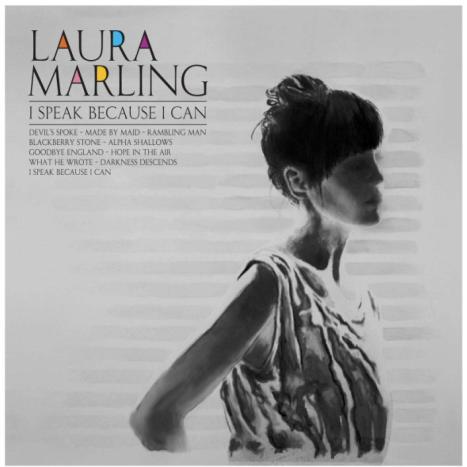Laura Marling’s 2008 debut Alas, I Cannot Swim flickered with sparks of promise, marking her out as one of the more interesting artists among the West London-based indie folk scene. Yet whatever that rawness was, it sadly hasn’t made it to her Ethan Johns produced follow-up. I Speak Because I Can is an accomplished record, but that’s it problem. The clever instrumentation feels self-consciously ragged and loose, and overall this is an overly safe step.
The fact is Laura Marling lacks the hours lived and scars received to have given the songs any real sense of the heart. Sure, her voice might have deepened a little in the last few years but this set of songs are nowhere near the strength of her debut; the record’s only earworms are the moments where Marling reminds the listener of other, bigger voices. While the dervish spinning rhythms of ‘Devil’s Spoke’ and the bare bones of ‘What We Wrote’ are very noticeable highlights, the songs are all just a little too together to be anything other than the sum of a painstaking production job – swelling in slo-mo like the run-of-the-mill metaphors that shape her promo videos.
In the press detritus that’s encircled I Speak Because I Can, much has been made of the ins and outs of the broken relationship that came between this album and her debut. As a contributory factor, its unimportant packaging – a young woman outgrows indie -folk no-mark boyfriend. Marling tiptoes around the edges of relationship issues on the record, but it never sounds like she’s investing the topic with any real personal weight, hurt or truth. Any of her exes picking up a copy of this record should feel lucky that they got off with a mild dig in the ribs.
Only 20 or so years old, Marling is attempting to exude a wisdom that never quite seems to ring true, instead relying on the themes of Greek myths or disappearing into meaningless lyrical obscurity. It’s therefore a record that’s hard to invest in. And this is I Speak Because I Can’s main problem; it’s a record that has sacrificed the grit of panda-eyed-smeared emotion and bloodied teeth for Plaster of Paris make-up and tidy production. As yet, Marling lacks the killer turn of phrase of a great writer, the membrane whisper of loss or the cracked inflection of a person in pain, and as a result, I Speak Because I Can feels like more of a casual performance than a set of tales worth hearing.


